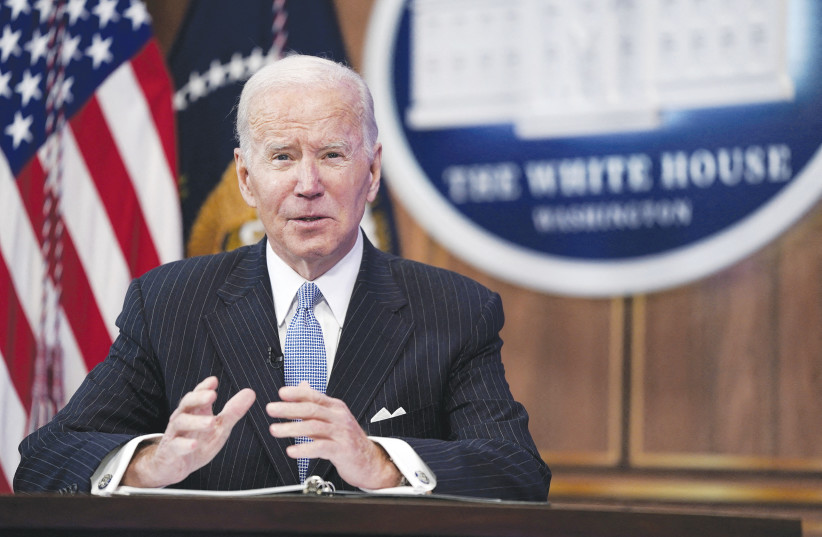A new year brings new hope to American Jews preparing to celebrate Rosh Hashanah this weekend. As we know, the Jewish New Year heralds a period of reflection and repentance, culminating 10 days later on Yom Kippur. It is the time of year when synagogues around the globe are filled to capacity, as congregants attend to pray for a blessed year ahead.
Our posture is hopeful, and we engage in traditions such as dipping apples in honey with the intention that the coming year should likewise be sweet and good.
But, amid the sweet moments, there are some sour reminders. The Days of Awe are also when Diaspora Jewish communities are on highest alert against antisemitic attacks. Even in our holiest moments, we are reminded of the historic rise in antisemitic threats facing the American Jewish community.
The trend of rising antisemitism seen in 2021 continued through 2022 and into 2023. Data from the Anti Defamation League (ADL) shows antisemitic incidents in the US have increased by over 35 percent in the past year, from 2,721 in 2021 to 3,697 in 2022. The proportion of attacks directed at Orthodox Jews, whose observance is more outwardly visible, was much higher.
Federal, state, and local policymakers have, thankfully, responded to this alarming reality.

In May, President Joe Biden released the first-ever National Strategy to Counter Antisemitism. It contains a lengthy list of actions the Executive Branch will take to make American Jews safer. But, as the National Strategy also notes, there are actions Congress can – and must – take within its authority. Foremost among them is providing more resources to Jewish synagogues, schools, and other institutions to ensure they have adequate security.
Over a decade ago, the Orthodox Union and a range of religious coalition partners spearheaded the creation of the Nonprofit Security Grant Program (NSGP), whereby the Department of Homeland Security (DHS) provides security funding for houses of worship and schools. This program enjoys bipartisan support in Congress, growing from $25 million in 2005 to $305 million in 2023.
However, as the fiscal year 2024 appropriations cycle has gotten underway, the Senate Appropriations Subcommittee for the DHS proposed slashing funding for the NSGP by $18 million. This is deeply concerning, not only because of the documented surge of antisemitism but because even at the current funding level, only 40% of NSGP grant applications were funded in 2023.
How can US lawmakers fight antisemitism and protect American Jews?
Ahead of the new Jewish New Year, the Orthodox Union is partnering with the Jewish Federations of North America (JFNA) and the ADL for a Capitol Hill briefing alerting our leaders to the threats faced by the Jewish community and the importance of security funding.
The briefing aims to alert lawmakers to the threat our community faces daily. Whether it’s children on their way to school, fathers coming home from synagogue on a Friday night, or young adults on America’s college campuses, none of these groups should face the constant threats and attacks targeted at them.
There are other steps Congress must take to combat today’s antisemitism. On American university campuses, antisemitic incidents continue and make Jewish students feel unsafe and marginalized.
The House and Senate Committees on Education should hold hearings and shine a spotlight on university campus administrations that are responding properly, and on those who are failing to do so. And, Congress should pass the Stop Anti-Semitism on College Campuses Act, sponsored by Congressman Lawler (R-NY) and Congressman Gottheimer (D-NJ).
Antisemitism has been around for centuries and is never going to be fully erased. But American Jews are blessed to live in a country where the national leadership is committed to combating antisemitism and ensuring, in the words of president George Washington, that every American Jew will be able to “sit under his own vine and fig tree and none shall make him afraid.”
On Rosh Hashanah, the start of a fresh new year, we have the custom of eating round challah bread as a symbol of the cyclical nature of the calendar. There is both continuation and renewed hope.
Today, a united Jewish community is calling on Congress to take action to make this promise more real.
We pray that they will and that the New Year will be one of safety and blessing for all.
The writer is executive director for public policy at The Orthodox Union.
